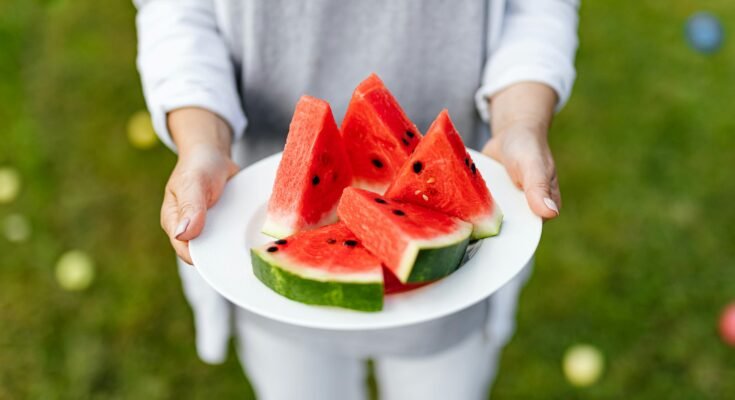Watermelon (Citrullus lanatus) is a juicy, sweet, and very refreshing tropical fruit worldwide. Shifting from its African origin, it has now turned into one of the traditional summer delicacies. Besides the taste, it gives a tug towards health benefits. With high vitamins, minerals, and bioactive compounds, watermelon packs a whole lot of health rewards. This will involve discussing its contribution to health, including nutritional value, health benefits, and prevention of diseases.
Nutritional Profile of Watermelon
Approximately 92% of watermelon contains water, thus making it a very good source of hydration. It is, however, nutritionally endowed with all essential vitamins, minerals, and bioactive compounds. One hundred grams of watermelon serve the following nutrients:
Calories: 30
Carbohydrates: 7.6 grams
Sugars: 6.2 gram
Fiber: 0.4 grams
Vitamin C: 8.1 milligrams (13% RDI)
Vitamin A: 569 IU (11% RDI)
Potassium: 112 milligrams
Magnesium: 10 milligrams
Health Benefits of Watermelon
Health Benefits of Watermelon
- Hydration
Rich in moisture, watermelon is among the fruits that hydrate best. Well-hydrated features maintain numerous bodily functions: cool the body temperature, support metabolism, and allow nutrients to flow through. Therefore, eating watermelon can, to some extent, replace daily fluid intake, especially in hot weather or after physical activity. - Antioxidants
The antioxidants found in watermelon include lycopene, beta-carotene, and vitamin C, all of which are good. They neutralize harmful free radicals that lead to oxidative stress, which can result in chronic illness such as heart diseases and van-cers. Lycopene is specially tagged as a good protector against some cancers like prostate cancer. - Cardiovascular Health Components
Watermelon protects heart health, thanks to lycopene as it has been shown to lower cholesterol and blood pressure. Science shows that lycopene lowers stiffness in arteries and decreases the alarm of inflammation, both of which make the heart healthier. Another amino acid present in watermelon is called citrulline, which can raise the amount of nitric oxide to be produced. This allows for relaxation of the blood vessels and in turn allows for better circulation. - Aids Digestion
Watermelon contains just a small amount of fiber but is composed of 90% water. These two components assure healthy digestion. Soluble fibers contribute to proper bowel regulation, while water ensures soft stools by lubricating yummy through the gastrointestinal tract. These elements render watermelon another sweet little helper to our digestive functions. - Boosts Immunity
Melons are good sources of vitamin C, a nutrient vital for a strong immune system. Vitamin C stimulates the formation of white blood cells, the foremost line of immune defense against infection. Thus, regularly eating vitamin C-containing foods, including watermelon, may have a positive effect on the duration and severity of diseases.
6.Improves Skin and Hair Health
Watermelon comes with vitamins that cause skin and hair improvement, like vitamin A and vitamin C. Vitamin A is responsible for cell repair and regeneration; therefore, the skin remains soft and young. Vitamin C has vital roles in collagen production, which performs skin elasticity and firmness as well as hair strengthening.
- Weight Management
Watermelon is very low-calorie food with maximum water content so it can be a healthy snack while managing weight. They are sweet, so they can curb craving or want for high-calorie cakes just as 85% of water in them fills up and so gives that fullness. - Eye Problems Help
Beta-carotene gives rise to vitamin A in the body, which is necessary for normal vision. Vitamin A protects the surface of the eye and lowers the risk of age-related macular degeneration, a leading cause of visual loss because of aging in the population.
- Anti-Inflammatory Properties
Watermelon contains a number of compounds such as lycopene and vitamin C. These compounds are anti-inflammatory and reduce the markers of inflammation in the body; therefore, they may have implications in the alleviation of symptoms in chronic conditions such as arthritis and inflammatory bowel diseases. - Performance and recovery of exercises improve
Citrulline in watermelon improves performance and reduces muscle soreness from exercise. Citrulline improves oxygen delivery to muscles, increasing endurance during workouts. Furthermore, drinking watermelon juice after exercise is said to enhance muscle recovery. - Promotes Kidney Health
High water content of watermelon will flush out toxins found in kidneys and help reduce the risk of kidney stones. Potassium found in watermelon also helps to regulate fluid balance thus preventing accumulation of calcium, which may lead to the formation of stones.
12.Bones Benefiting from Watermelon
Watermelon contains an important element in magnesium and potassium for bone densification and strength. It reduces the risk of osteoporosis and fractures as we mature. Calcium balance from these minerals prevents osteoporosis.
Watermelon for Prevention of Major Disease
- Cancer Control
An exploration has been done towards several aspects of lycopene in watermelon while focusing on cancer control. Lycopene scavenges destructive free radicals, minimizing DNA impairment. This has been evidenced to lessen the rate of prostate cancer, breast cancer, and colorectal cancer. - Risks of Heart Disease
Consuming watermelon lowers blood pressure and cholesterol levels, which collectively reduce the risks of heart disease. Lycopene is mainly helpful with the ho sustain improvement to arterial health while citrulline improves blood flow, which is good for heart health. - Better Management of Diabetics
Though watermelon contains natural sugars, due to its relatively low glycemic load, it can be considered safe in moderate amounts for diabetics. It contains a host of other ingredients that may boost insulin sensitivity and inhibit dangerous spikes in blood sugar levels.
Watermelon in Culinary Uses
Watermelon is adaptable to be eaten in different ways.
Fresh slices: They make for simple-sale and the most favorite way to eat watermelon.
Juices and smoothies: Quenching fruits provide revitalizing drinks.
Salads: Mixed with feta cheese, mint, and enlivening arugula.
Grilled watermelon: A first-of-its-kind and flavorful way to enhance its inherent sweetness.
Pickled rind: New uses for watermelon rind come in as the wave of the technology reducing food waste.
Not only is it edible, but watermelon seeds are also considered a nutrient-rich source of magnesium, zinc, and protein. Roasted watermelon seeds are a healthy snack.
Considerations
Though watermelon is safe for the majority of people, there are some factors to be considered:
- Over-eating: If someone eats a lot of watermelon, the fiber and the water content might cause some digestive complications.
- Allergies: Certain individuals might have quite rare allergic reactions to watermelon but this is extremely uncommon.
- Potassium level: Patients who have kidney problems need to monitor their potassium intake; because excess potassium can create complications.
Conclusion
Watermelon is not just another summer treat; it is a nutritional fitting pontoon that has plenty of health benefits. From keeping the body hydrated to reducing the risks of chronic diseases, watermelon possesses many advantages that will heighten one’s wellness. It is so versatile and delicious that adding it into any diet should be a snap. All in all, regular consumption of watermelon means you love its mouth-watering greatness while enjoying its wonderful health benefits.




